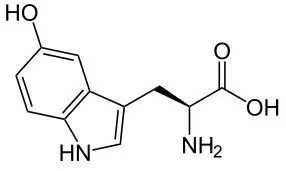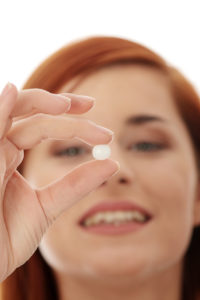Table of Contents
5-HTP (5-Hydroxytryptophan or oxitriptan) is an amino acid that is naturally produced in your body. 5-HTP is synthesized from the amino acid tryptophan which we get from food.
5-HTP is the immediate precursor of serotonin. And as a nootropic and dietary supplement, 5-HTP is popular with those who advocate its effectiveness in treating depression. Along with a number of other serotonin-related diseases.
But using 5-HTP for treating depression and anxiety is not supported by science. The research is contrary to how 5-HTP is viewed by many, including medical doctors.
When we dig into the research, we find that 5-HTP may be contraindicated for depression in those whom marketers advocate its use.[i]
We’re all for boosting neurotransmitter levels and optimizing cognitive performance here at Nootropics Expert®. But now and again I run into a nootropic or dietary supplement that may be popular. But also may be a particularly bad idea.
We’re going to get to the bottom of how 5-HTP works in your brain in this review. We’ll examine why it’s critical for brain health. And reasons why you may want to find another way to boost serotonin levels in your brain.
5-HTP helps:
- Anxiety & Depression. 5-HTP is synthesized into serotonin in brain cells. Elevating levels of serotonin can help relieve the symptoms of anxiety and depression.
- Neurotransmitters. 5-HTP is a necessary ingredient for serotonin synthesis which boosts mood and social behavior, improves memory, regulates appetite and digestion, sleep, sexual desire and function.
- Brain Optimization. A critical balance of the primary neurotransmitters serotonin and dopamine are needed for the highly optimized brain. When these neurotransmitters are not in balance it affects mood, memory, cognition, decision-making, sexual desire, and a host of other critical life functions.
What is 5-HTP?
5-HTP (5-Hydroxytryptophan or oxitriptan) is an amino acid that’s synthesized from the essential amino acid tryptophan.

Tryptophan is hydroxylated by tryptophan hydroxylase to 5-HTP (5-hydroxytryptophan), then decarboxylated to serotonin (5-hydroxytryptamine or 5-HT).[ii]
Tryptophan → 5-HTP → serotonin
80-90% of your body’s serotonin is made in your intestines. But serotonin cannot cross the blood-brain barrier. So all the serotonin that your brain needs has to be made within the brain. This is where 5-HTP comes in…
5-HTP crosses the blood-brain barrier more readily than tryptophan. And gets synthesized into serotonin at a faster rate than from tryptophan.[iii]
As a neurotransmitter, serotonin influences directly and indirectly, the majority of brain cells. So if you want to boost serotonin in your brain, some find that supplementing with 5-HTP is better than taking tryptophan.
Tryptophan, which your body uses to make 5-HTP, can be found in turkey, chicken, milk, potatoes, pumpkin, sunflower seeds, turnip and collard greens, and seaweed.
5-HTP as a nootropic supplement is a naturally occurring amino acid derived from seed pods of Griffonia simplicifolia, found in West and Central Africa. 5-HTP content in extracts of this plant vary from 2 – 20.83% (from seeds obtained in Ghana).[iv]
How does 5-HTP work in the Brain?
5-HTP is a precursor to serotonin. The neurotransmitter serotonin plays a role in sleep, appetite, learning & memory, mood, and sexual function.
When tryptophan’s role in converting to 5-HTP for boosting serotonin doesn’t work efficiently, the result is often depression, chronic headache and insomnia.
An open-label trial was conducted in Italy to determine the efficacy of using 5-HTP in young subjects with high levels of “romantic stress”.
Serotonin has been linked to human romantic attachment. So researchers in this study set out to determine brain levels of Brain-Derived Neurotrophic Factor (BDNF) and serotonin in relation to changes in romantic stress during the study.
15 healthy subjects (mean age 23.3 years) who had a “romantic breakup” took part in the study. Participants received 60 mg of Griffonia simplicifolia extract containing 12.8 mg 5-HTP daily for 6 weeks.
The subjects were evaluated for BDNF and serotonin levels at the beginning of the study, at 3 weeks and then again at the end of the 6-week trial.
The scientists observed significant improvements in romantic stress scores from weeks 0 through 3. So far, 5-HTP seems to be working. But no further improvement was seen from weeks 3 through 6. Even though the young people had significantly higher levels of BDNF and serotonin.[v]
More Involved in Depression and Stress than Serotonin
This “romantic breakup” study is a classic illustration of why using 5-HTP alone to treat depression and stress may not work. And if it does work, why it may not work for long.
Depression is often more than simple serotonin dysfunction. Depression can also be associated with catecholamine dysfunction, including dopamine and/or norepinephrine. Or a combination of serotonin and catecholamine dysfunction.
When you take 5-HTP alone, you are also depleting dopamine, norepinephrine, and epinephrine. Synthesis of serotonin from 5-HTP, and dopamine from L-DOPA is catalyzed by the same enzyme, L-aromatic amino acid decarboxylase (AAAD).
Dopamine and serotonin precursor supplementation must be taken in proper balance. Because when you use only 5-HTP, it dominates dopamine at the AAAD enzyme synthesis level.
Blocking dopamine synthesis at the AAAD enzyme through competitive inhibition will lead to depletion of dopamine and the rest of the catecholamines.[vi]
Going back to our Italian study of young people dealing with “romantic stress”, the subjects stopped responding to 5-HTP in the 2nd half of the study. Likely because their catecholamines became depleted through continuous 5-HTP supplementation.
Studies have found that when dopamine is depleted enough, 5-HTP will no longer function.[vii]
Catecholamine Dysfunction Affects More Than Just Depression
When catecholamine neurotransmitter levels (dopamine and/or norepinephrine) influence depression, supplementing with 5-HTP alone is not the way to go. Because you may deplete dopamine and norepinephrine, worsening the disease and its underlying cause.
But this contraindication is not exclusive to depression. It extends to all other diseases where catecholamine dysfunction has been implicated. Including ADHD[viii], obesity, anxiety, seasonal affective disorder (SAD), and Parkinson’s Disease.[ix]
How things go bad
 Amino acid precursors of serotonin (i.e. 5-HTP) and dopamine (i.e. L-Tyrosine) work together during synthesis, metabolism and transport to the point that they function as one system.
Amino acid precursors of serotonin (i.e. 5-HTP) and dopamine (i.e. L-Tyrosine) work together during synthesis, metabolism and transport to the point that they function as one system.
When serotonin and dopamine are properly balanced, functions that are regulated only by serotonin, can be regulated by manipulating dopamine levels. And functions regulated only by dopamine in this balanced state can be regulated by manipulating serotonin.[x]
When you mess with this balance and improperly supplement with serotonin or dopamine precursors, you don’t get the desired effect of using that nootropic. And you increase the possibility of side effects with too much serotonin.
If you supplement with only one precursor (i.e. 5-HTP to boost serotonin) that dominates the other system (i.e. dopamine synthesis), depletion of the dominated system will occur (i.e. depleted dopamine).
And if this effect is pronounced enough, you will not get the benefit you were aiming for when supplementing with the original precursor (i.e. 5-HTP).
A powerful example of this effect is in the management of Parkinson’s Disease where the effects of L-DOPA are no longer observed over time due to serotonin depletion.[xi]
Since serotonin and dopamine cannot cross the blood-brain barrier, the number of serotonin and dopamine molecules in the brain is a function of the amount of nutrients (amino acid precursors) that are available to be synthesized into new neurotransmitter molecules.
Optimizing brain function with minimal side effects is NOT a function of supplementing until you get sufficiently high amino acid levels. It’s a function of achieving the proper balance between serotonin and dopamine.
5-HTP benefits
5-HTP is absolutely critical for synthesis of serotonin in your brain. But supplementing with 5-HTP to boost serotonin does not work well.
Using 5-HTP to treat depression has had very little success over the last few decades of clinical trials and biohacking.
Integrating 5-HTP into your nootropic stack is much more complicated than simply adding some 5-HTP in order to boost serotonin.
5-HTP alone will not work for depression, or any other issue you’re dealing with involving the catecholamines (dopamine, norepinephrine, epinephrine) because of 5-HTP’s tendency to deplete those neurotransmitters.
5-HTP will boost serotonin in your brain.[xii] But 5-HTP must be carefully stacked with precursors for dopamine and norepinephrine or you risk making the situation worse.
You must avoid supplementing with only one of the serotonin or dopamine amino acid precursors. When amino acid precursors are not in balance, you end up with decreased effectiveness of that nootropic, increased side effects, and depletion of the non-dominant system.
How does 5-HTP feel?
Reactions to supplementing with 5-HTP vary considerably but the one consistent theme is initial feelings of well-being, better sleep, less need for sleep, improved mood, less social anxiety, lower appetite, improved tolerance for stress and improved cognitive function.
And after a couple of weeks of dosing 5-HTP – side effects begin. Serotonin overload results in dopamine and norepinephrine depletion.
Side effects include feelings of lethargy, depression, brain fog, stomach pain, and possibly a chronic tension type of headache. Worst case scenario is nausea, vomiting and even blacking out.
Neurohackers who report consistent success supplementing with 5-HTP stack it with B-Vitamins, a dopamine precursor like L-Tyrosine, and only use 5-HTP as needed.
Those who have a bad experience with 5-HTP from the start often have no idea why they’ve reacted badly. But an educated guess is their depression was catecholamine (dopamine, norepinephrine, epinephrine)-related. And boosting serotonin made their dopamine-related issues worse. Very quickly.
One huge word of WARNING: Do NOT take 5-HTP with any antidepressant medication. You put yourself in the very real danger of Serotonin Syndrome which can ultimately kill you.
5-HTP Clinical Research
5-HTP supplements are heavily marketed as a natural remedy for depression. But the science does not support using 5-HTP for depression. We have decades of clinical trials available. And there is no evidence of the efficacy in using 5-HTP for depression.
5-HTP instead of selective serotonin reuptake inhibitors
The Department of Public Health at the University of Queensland Medical School in Australia did a systematic review of literature dating from 1966 – 2000 for “5-HTP” and “depression”.
The researchers found 108 clinical studies of which only 2 studies, one with serotonin (5-HT) and one with L-Tryptophan for a total of 64 patients met sufficient quality criteria to be included. These studies suggest serotonin (5-HT) and L-Tryptophan are better than placebo at alleviating depression.
But the researchers noted “the small size of the studies, and the large number of inadmissible, poorly executed studies, cast doubt on the results from potential publication bias, and suggests that they are insufficiently evaluated to assess their effectiveness.”[xiii]
5-HTP for Fibromyalgia
A double blind controlled study in Italy studied the efficacy of using 5-HTP in treating fibromyalgia symptoms.
50 patients with primary fibromyalgia syndrome were selected for this study. This 1990 study did not publish the amount of 5-HTP used. But the researchers found a significant improvement in fibromyalgia symptoms with only mild and transient side effects.[xiv]
5-HTP for Treatment of Depression
Insufficient activity of the neurotransmitters serotonin and norepinephrine is a central element of the model of depression most widely held by neurobiologists today.
In the late 1970’s and 1980’s, numerous studies were performed in which depressed patients were treated with the serotonin precursors L-Tryptophan and 5-Hydroxytryptophan (5-HTP), and the dopamine and norepinephrine precursors Tyrosine and L-Phenylalanine.
A summary published in the Alternative Medicine Revue looked at the data from all these studies. The author noted that the nature of the studies makes it difficult to draw firm conclusions regarding the efficacy of neurotransmitter precursors for treating depression.
While there is evidence that precursor loading could work, particularly for serotonin precursor 5-HTP, more studies of suitable design and size “might lead to more conclusive results”.[xv]
Those studies have not materialized since that report was published 22 years ago.
5-HTP Recommended Dosage
Recommended dosage of 5-HTP if you’re going to try it is 50 mg 1 – 3 times per day.
Some studies have used higher doses than the recommended dose, but 5-HTP can be toxic for your central nervous system at high doses.
For anxiety or depression, 5-HTP is dosed at 150 – 300 mg per day total.
To relieve post MDMA (Ecstasy) depression, 5-HTP 100 mg on Day 3-7 after MDMA use.[xvi]
Successfully supplementing with 5-HTP requires stacking it with a dopamine precursor like L-Tyrosine or L-DOPA along with B-Vitamins (for synthesis), and one of the sulfur-containing amino acids (methionine, cysteine, homocysteine, or taurine).
And you must monitor the effects this stack is having on your body. If you start experiencing side effects of any kind, it’s a good indication that either serotonin or dopamine is out of balance.
DO NOT combine 5-HTP with any kind of antidepressant medication.
Combining SSRI’s, Tricyclics or MAOI’s with 5-HTP will cause Serotonin Syndrome. An extremely dangerous condition involving severe mental changes, hot flashes, rapidly fluctuating blood pressure and heart rate, and possibly coma leading to death.
Serotonin Syndrome can kill you. And I’m not kidding here.
5-HTP Side Effects
5-HTP supplementation can cause heartburn, heart palpitations, headache, stomach pain, nausea, vomiting, diarrhea, drowsiness, sexual problems and muscle issues.
5-HTP can also cause some pretty radical mood changes including agitation, aggressiveness, anxiety, euphoria, poor decision-making, irritability, psychosis, restlessness and insomnia.
5-HTP can make the symptoms of schizophrenia, bipolar disorder and other mental disorders worse.
Serotonin Syndrome
And I can’t emphasize this enough so I’m going to repeat it here in case you missed it…
DO NOT combine 5-HTP with any kind of antidepressant medication. Or with carbidopa.
Combining SSRI’s, Tricyclics or MAOI’s with 5-HTP will cause Serotonin Syndrome. An extremely dangerous condition involving severe mental changes, hot flashes, rapidly fluctuating blood pressure and heart rate, and possibly coma.
And combining 5-HTP with carbidopa also has the potential of causing Serotonin Syndrome.
Serotonin Syndrome can kill you. And I’m not kidding here.
Type of 5-HTP to Buy
5-HTP is made from tryptophan in your body.
5-HTP as a nootropic supplement is made from extracts of the African tree Griffonia simplicifolia. 5-HTP supplements are typically in tablet or capsule form.
You’ll often find 5-HTP in many ready-made vitamin and herbal formulas.
Nootropics Expert Recommendation
5-HTP 50 mg up to 3-times per day
 I DO NOT recommend using 5-HTP as a nootropic supplement.
I DO NOT recommend using 5-HTP as a nootropic supplement.
Your body does synthesize 5-HTP on its own to make serotonin in your brain. And you can’t get 5-HTP from food. But you can get L-Tryptophan from food which is synthesized into 5-HTP in your body.
5-HTP may help you if you’re dealing with depression. But you must stack if with a dopamine amino acid precursor along with B-Vitamins and a sulfur-containing amino acid. See the “5-HTP Recommended Dosage” in this review above.
IF you are going to try 5-HTP, I suggest starting with a dose of more than 50 mg daily. You may want to take it in the evening because it could help sleep disorders.
Short-term dosing of 5-HTP of no more than 2 weeks seems to provide the most benefit if you’re going to benefit from this nootropic.
Or try using 5-HTP only on an “as needed” basis. For a mood boost, reduce social anxiety, and provide a short-term boost in cognition.
5-HTP supplementation on its own is NOT recommended. Nor is it recommended for long-term use.











Join The Discussion - 359 comments
Andrew
December 22, 2020
David,
Thank you for the in-depth on the subject. Very relevant to me.
Five years ago i took a natural SSRI called Kanna (Sceletium tortuosum) which is a a Dual 5-HT Reuptake and PDE4 Inhibitor for two or three months. Kanna did not do much but provided mild anti-anxiety effects which helped with going through some stressful meetings and events.
At the time i did not understand complex effects this kind of substances have on physiology and delicate neurotransmitter balance. After a few months of Kanna supplementation i have started experiencing GI upset and developed mild form of constipation which has never gone away ever since even though Kanna supplementation was stopped. Never had gut motility issues prior to this experience. Through the years of extensive experimentation with various supplements, lifestyle and diet changes and no effect on the issue i have come to the conclusion that chances are huge that i have slowed down gut motility by SSRI supplementation. I have read is not a rare side effect to experience permanent effects on gut motility with prescription SSRIs.
I have found a study done on rats that discovered slow release 5-HTP improving gut motility in rats with impaired function: https://www.sciencedirect.com/science/article/abs/pii/S0016508519367150
There is also a supplement called MotilPro by Pure Encapsulations which outlines this function in humans:
“5-HTP is absorbed by enterochromaffin cells in the epithelium, in which it is decarboxylated to serotonin using pyridoxal 5’ phosphate as a cofactor. 5-HTP stimulates enteric neurons through activation of 5HT4 receptors. ”
So my interest is in finding an optimal way to supplement 5-HTP to recalibrate receptors in the gut and restore enteric neurons which might have been altered by SSRI supplementation.
As i do not have interest in altering serotonin or dopamine levels in the brain (I do not feel i have depressive behaviours or any dopamine imbalance although you never know i guess) i wonder what is the optimal strategy to use 5-HTP in such case.
I would really love to hear your opinion on this.
David Tomen
December 22, 2020
Andrew, you’ve thought this through with some good research and I think you’re onto something. The problem is 5-HTP because most people don’t know how to dose it and use far too much. I wonder if you could do a similar thing using L-Tryptophan instead?
I also suggest trying a high quality prebiotic as well. I’ve been using the Performance Lab Prebiotic with amazing results. More on that here: https://bit.ly/2KzeQi2
Daniel
January 17, 2021
I’m also looking at motilpro, I was on antidepressants for 15 years and came off 4 years ago but my motility is destroyed and I now have sibo, I think the antidepressant have downregulated my gut serotonin receptors , will motilpro further down regulate my receptors if I try it and then stop?
David Tomen
January 17, 2021
Daniel, as far as I can tell MotilPro contains Vitamin B6, ginger extract, ALCAR and 5-HTP. I can’t imagine how those ingredients would “downregulate” serotonin receptors.
Daniel Doherty
January 18, 2021
Is there any nootropic to help repair gut serotonin receptors?
David Tomen
January 18, 2021
Daniel, not a nootropic but certain intestinal bacteria are involved in serotonin synthesis and transport. For example, Lactobacillus acidophilus and Bifidobacterium longum upregulate serotonin transporter expression according to this study: https://pubmed.ncbi.nlm.nih.gov/29451186/
The science in this area is ongoing and intense. But the bottom-line from what I’ve seen so far is certain prebiotic bacteria and their support is the direction this is going.
Carmen Mirelle
December 15, 2020
Hi David, thank you so much for creating this website and for sharing all of your knowledge. Could you please give me your view on alleviating temporarily lowered serotonin levels?
100mg 5htp
100mg L-theanine
100mg Lemon balm
B vitamins
Given this is for a temporary fix, do I need to worry about adding a dopamine amino?
Thank you so much in advance 🙂
Given this is for temporary
David Tomen
December 15, 2020
Change 5-HTP for 250 – 500 mg L-Tryptophan which is safer and more effective for use long-term. And you don’t need to worry about dopamine at those dosages. Unless you are low in dopamine too.
Paul
December 1, 2020
Dear David,
brilliant website I must say. I’ve got a couple of questions left after spending my night browsing it, some if which I hope you may find intriguing too. I seem to be quite the opposite of you with a low serotonin and a high dopamine system that I’m trying to tweak into balance.
1. As I suppose many do, I got here researching 5-HTP which I can see you’re not a great advocate of to say the least. You probably already have saved me from enjoying it for 4-6 weeks and staring dumb when it wears off. However, I don’t see similar concerns raised by you about its precursor L-tryptophan. Why the difference? Can dosing of L-tryptophan be that much more accurate and/or does the actual 5-HTP content of those supplements vary that wildly?
I started researching nootropics after a DNA test recommended 5-HTP it for a gene of mine that results in “lower transformation of Tryptophan into 5-HTP” and therefore reduced brain serotonin levels. I’d start with 50mg 5-HTP-s once a day and wouldn’t go over 150mg/day total just having read what I’ve read. Knowing about the gene factor, would you still advise against this and experiment with 500-1000mg of L-Trypto instead?
2. My DNA test also says my dopamine system is very active to start with, due to an especially passive COMT gene massively limiting reuptake. Without the test results, I would simply describe this as being able to feel my frontal lobe exploding under massive stress, and that’s always how I’ve been, so I’d really rather avoid going overboard with dopamine. What’s the lowest dose you’d find it reasonable to start with? Capsules available here are 500mg, but I’m more inclined to get it in powder form and start as low as 50mg, gradually working it up if needed.
3. As for sulfur-containing amino acids, I already take 600mg NAC a day for inflammation as I’m predisposed to heart problems, would that do to keep things in balance?
4. I’m also taking alpha-lypoic acid and turmeric+piperine for inflammation. Would you worry about turmeric acting as a MAOI in the context of 5-HTP or L-Tryptophane? Would taking the Trypto in the morning and turmeric in the evening migitate this risk? There half-lives wouldn’t really overlap that way. (I don’t need help with my sleep, I need help with my day, my mood and my creative focus.)
5. NADH for entering a creative flow sounds really awesome but it’s also ridiculously expensive where I live, the cheapest available is $60 for 60 tabs. Would you argue it’s worth the price? (It’d probably cost more than my entire stack, the rest of which is a vitamin complex and some L-Carnytine on top of the above.)
Really curious about your take on these.
Paul
David Tomen
December 2, 2020
Paul, if your system has a hard time synthesizing 5-HTP from tryptophan you may be better off with low dose 5-HTP. But do this with eyes wide open. Where people get into trouble is using it to try and treat depression. That has been shown time and again to stop working after 4 – 6 weeks. I think because it suppresses dopamine and they end up dopamine-deficient.
Really the only way to tame dopamine is by raising serotonin. Dopamine and serotonin must be in balance. But that balance is unique to you. If you’ve already got a problem with dopamine I suggest concentrating on serotonin with 5-HTP for now. And leave dopamine alone.
NAC 600 mg 3-times per day will help your brain use dopamine. As well as provide the other benefits it’s known for. Like boosting glutathione.
Monoamine Oxidase Inhibitors (MAOI) raise the catecholamines like dopamine, norepinephrine and epinephrine much more that serotonin. Another reason for you to avoid L-Tyrosine. The problem with Tryptophan or 5-HTP in the morning is it can bring on fatigue. That’s why people use it before bed. If you keep the 5-HTP dose low enough this may not be a problem.
And only thing I can suggest is if you are intrigued by NADH is try it. You may find that it doesn’t provide as much benefit for you as you think. But you’ll never know until you try it.
Paul
December 17, 2020
Dear David,
thank you for reply. I’ll leave an update here in case a search will lead someone with a similar situation here: 2 weeks of 50 mg of 5-HTP is doing wonders, I’ll try 100 mg from tomorrow.
I was getting an interesting side effect though, even mild conflict situations started to cloud my brain to an unfamiliar extent, at the worst point coupled with a massive headache. I’ve only done one dose of NAC before and upped it to two a day, taking the added one with the 5-HTP. Side effects stopped right as I stopped the extra NAC. Looks like NAC alone can kick my dopamine out of balance.
NADH is on the way, will update on that too.
Heather
November 18, 2020
I am experimenting here and there is such conflicting info out there. I was thinking about stacking l-tyrosine, l-theanine, and GABA. I need better focus and concentration and also relief from mild anxiety. Would those three things be ok? and what about dosages? The GABA I bought is 750mg but everything I read recommends no where near that high. like 100-275mg. I’m overwhelmed by all of this.
David Tomen
November 19, 2020
Heather, you will find dosage recommendations for each of these supplements here on Nootropics Expert (https://nootropicsexpert.com/nootropics-list/).
You’ll also find separate articles on boosting concentration and memory. And at least 2 articles on taming anxiety.
It’s all here for you. And in very easy to understand English. I suggest you start reading. 🙂
Nasha
November 17, 2020
Hi,
I’ve used a supplement containing 60 mg 5-htp, 75 mg tryptophan, vitamin b3, B6, c, d3, selenium and magnesium citrate and betaine. I took 2 of these daily and experienced nightmares and problems with orgasms. I think I’ve used them for 2.5 week.(started on October 19th) it’s gonna be ten days since I stopped taking them but I experience strong anxiety, worse than before. I decided to try l-tyrosine 5 days ago, took 350 mg of nalt but the I experienced strong anxiety the second day. I dont have nightmares anymore although it’s still a bit harder to orgasm (I’m a female). Expect for the second day I took nalt.. My question is: is it possible that the supplements containing 5-htp are still causing me to experience anxiety more than before? I’m having rough times..
David Tomen
November 17, 2020
Nasha, it could be still causing your problems. It’s why I don’t recommend using 5-HTP and to use L-Tryptophan instead. Because chances are the dose you think was in that capsule bears no resemblance to what was actually in there. 60 mg is a low does and should not have caused that severe of a problem.
The half-life of 5-HTP ranges from 2.2 to 7.4 hours (https://pubmed.ncbi.nlm.nih.gov/6187038/). So it is completely cleared from your system in less than 15 hours.
But you may be especially sensitive to supplements. And even 60 mg or 350 mg is too much for you.
Did you mean that it was easier to orgasm on your second day of using NALT? I suggest learning about how NALT (https://nootropicsexpert.com/n-acetyl-l-tyrosine/) works in your brain and how it produces more than just dopamine. Dopamine is certainly involved in libido and your sex hormones. But it also produces norepinephrine which could cause anxiety.
Nasha
November 17, 2020
Thank you so much for your fast response! I took it two times a day so that would be 120 mg a day.. I only tried to orgasm the second day of taking nalt, but my main issue is the anxiety I am experiencing. I was having nightmares daily when taking 5-htp. I’m gonna try all of the supplements recommend for anxiety, one by one. I’ve started talking Alpha GPC today. I do use l-theanine daily, or shall I exclude it when trying the recommended supplements one by one?
David Tomen
November 19, 2020
Nahsa, if you want to get a true reading on how each precursor affects you I suggest not using L-Theanine while you are experimenting.
Steven
November 11, 2020
David,
I have been using 5HTP for years, after being advised to do so by a family member. I am dealing with depression and anger and considering some anti-depressants in the coming weeks after an appointment with my doc. I am glad I read your article, as I am thinking I shouldn’t be taking it anymore. I have been taking both 200mg 5HTP along with Bvitamins daily for the last 5 years or so. My question is what should I do now? If I read correctly, I have been doing exactly what I shouldn’t have but I am not seeing or reading how I should proceed now. Can I just stop taking them cold-turkey or should I taper off? Any advice would be great.
Steven
David Tomen
November 13, 2020
Steven, you’ll need to taper off of 5-HTP if you’ve been using it for years. And you definitely cannot use it if you’re going to be using antidepressants.
Martin
October 31, 2020
Hi, I’m taking around 1-1.5gr de L Tyrosine combined with my regular stack (asghawanda,L-theanine,racetams,complex b)
I’m reading a lot your webpage and YouTube channel (is fastastic) but now I want to increase a lot my serotonin and put that in balance, but I feed that my 250gr of tryptophan daily is not enough. I read that you took 5htp because you take a lot l tyrosine, I wonder if you can advice a safe dosage for 5htp or tryptophan for take daily before bed
David Tomen
October 31, 2020
Martin, depending on your levels you can try 500 – 1,000 mg L-Tryptophan before bed. I use 1,000 mg L-Tryptophan because I use so much Tyrosine and Mucuna.
5-HTP is not a good way to increase serotonin. I only use 25 mg sections of a 100 mg lozenge under my tongue when I feel like I’m on edge from excess dopamine during the day. That calms it down quickly. But it’s a temporary fix.
Toka
September 26, 2020
Hi David!
Serotonin supplements (SS) work to elevate my mood every fast, but it creates tremendous amount of water retention in my body. Is there anything that could be done so that we can boost serotonin but the body doesn’t hold water, specially in the mid-section?
I don’t want to use Diuretic all the time because it causes dizziness and headache. And, I don’t understand why SS makes me less dominant and lethargic in social situation. Can’t we just uplift mood and be vigorous at the same time?
David Tomen
September 28, 2020
Toka, when you say “serotonin supplements” are you referring to 5-HTP or L-Tryptophan? Because there is a big difference. Most people don’t have problems using L-Tryptophan. But problems with 5-HTP come up all the time.